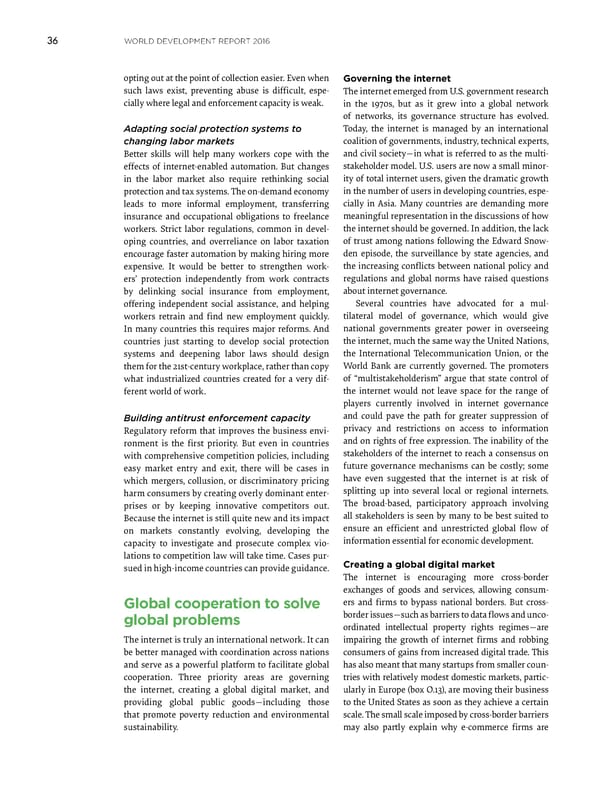WORLD DEVELOPMENT REPORT 2016 36 opting out at the point of collection easier. Even when Governing the internet such laws exist, preventing abuse is difficult, espe- The internet emerged from U.S. government research cially where legal and enforcement capacity is weak. in the 1970s, but as it grew into a global network of networks, its governance structure has evolved. Adapting social protection systems to Today, the internet is managed by an international changing labor markets coalition of governments, industry, technical experts, Better skills will help many workers cope with the and civil society—in what is referred to as the multi- effects of internet-enabled automation. But changes stakeholder model. U.S. users are now a small minor- in the labor market also require rethinking social ity of total internet users, given the dramatic growth protection and tax systems. The on-demand economy in the number of users in developing countries, espe- leads to more informal employment, transferring cially in Asia. Many countries are demanding more insurance and occupational obligations to freelance meaningful representation in the discussions of how workers. Strict labor regulations, common in devel- the internet should be governed. In addition, the lack oping countries, and overreliance on labor taxation of trust among nations following the Edward Snow- encourage faster automation by making hiring more den episode, the surveillance by state agencies, and expensive. It would be better to strengthen work- the increasing conflicts between national policy and ers’ protection independently from work contracts regulations and global norms have raised questions by delinking social insurance from employment, about internet governance. offering independent social assistance, and helping Several countries have advocated for a mul- workers retrain and find new employment quickly. tilateral model of governance, which would give In many countries this requires major reforms. And national governments greater power in overseeing countries just starting to develop social protection the internet, much the same way the United Nations, systems and deepening labor laws should design the International Telecommunication Union, or the them for the 21st-century workplace, rather than copy World Bank are currently governed. The promoters what industrialized countries created for a very dif- of “multistakeholderism” argue that state control of ferent world of work. the internet would not leave space for the range of players currently involved in internet governance Building antitrust enforcement capacity and could pave the path for greater suppression of Regulatory reform that improves the business envi- privacy and restrictions on access to information ronment is the first priority. But even in countries and on rights of free expression. The inability of the with comprehensive competition policies, including stakeholders of the internet to reach a consensus on easy market entry and exit, there will be cases in future governance mechanisms can be costly; some which mergers, collusion, or discriminatory pricing have even suggested that the internet is at risk of harm consumers by creating overly dominant enter- splitting up into several local or regional internets. prises or by keeping innovative competitors out. The broad-based, participatory approach involving Because the internet is still quite new and its impact all stakeholders is seen by many to be best suited to on markets constantly evolving, developing the ensure an efficient and unrestricted global flow of capacity to investigate and prosecute complex vio- information essential for economic development. lations to competition law will take time. Cases pur- sued in high-income countries can provide guidance. Creating a global digital market The internet is encouraging more cross-border exchanges of goods and services, allowing consum- Global cooperation to solve ers and firms to bypass national borders. But cross- global problems border issues—such as barriers to data flows and unco- ordinated intellectual property rights regimes—are The internet is truly an international network. It can impairing the growth of internet firms and robbing be better managed with coordination across nations consumers of gains from increased digital trade. This and serve as a powerful platform to facilitate global has also meant that many startups from smaller coun- cooperation. Three priority areas are governing tries with relatively modest domestic markets, partic- the internet, creating a global digital market, and ularly in Europe (box O.13), are moving their business providing global public goods—including those to the United States as soon as they achieve a certain that promote poverty reduction and environmental scale. The small scale imposed by cross-border barriers sustainability. may also partly explain why e-commerce firms are
 World Development Report 2016 Page 52 Page 54
World Development Report 2016 Page 52 Page 54